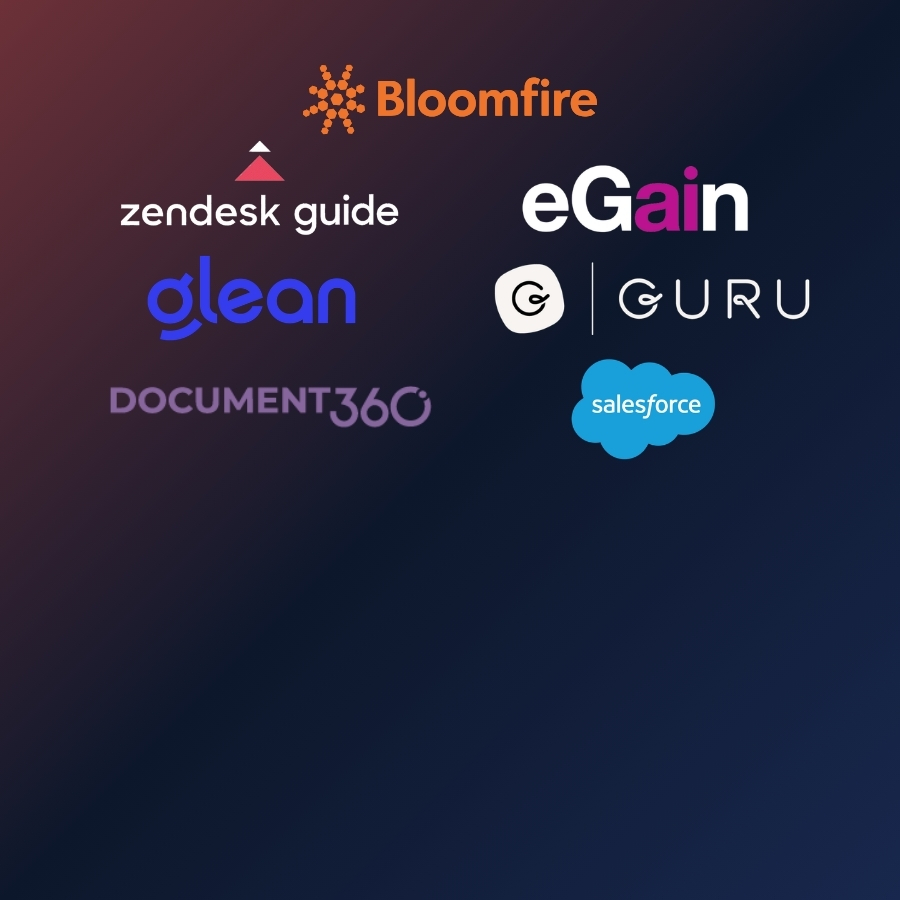The Value in Knowledge Sharing Sessions

Because companies have various departments with many different employees who are filled with knowledge, it can be overwhelming to find the specific people who have the answers you are looking for. When you find the person with the desired information, they might be reluctant to share their knowledge with you. These delays can create issues in your company’s productivity, and ultimately lead to information silos.
Luckily, there is a simple concept you can implement in your company. Knowledge sharing sessions can prevent information silos by ensuring that everyone in your company has the appropriate knowledge they need. Employees will also be able to find someone with the information they need much quicker.
By implementing knowledge sharing sessions within your company, your team will be able to seamlessly exchange information with each other, which means faster results and increased knowledge across your organization.
What Are Knowledge Sharing Sessions?
Knowledge sharing sessions are meetings where teams come together to share their knowledge for the betterment of the company or to assist other employees. This knowledge includes skills, data, best practices, and more. Some knowledge sharing examples include brainstorming sessions, shadowing/mentoring employees, and simple lunch-and-learn sessions.
When meeting in these knowledge sharing sessions, it’s important to understand the different kinds of shared knowledge, so information can be easier to understand and obtain.
- Explicit Knowledge is easily articulated, accessed, and shared. This knowledge is common in things like training guides and databases.
- Implicit Knowledge is harder to articulate but easier to demonstrate. For instance, an employee might be unable to describe how to do something, but can show you how. Observing your employees do their work is a good way of obtaining implicit knowledge.
- Tacit Knowledge is based on an individual’s personal experience and values. To share tacit knowledge, an employee might tell a story about how their actions influenced a customer and how their personal experiences shaped the sale.
Understanding these different kinds of knowledge can help you determine what type of information you’re trying to learn and the best methods for obtaining that information.
Sharing knowledge in the workplace can be easy and beneficial to your company. Instead of figuring out where you can obtain specific information, you can rely on your team to know who, or how to access the information.
What Are the Benefits of Knowledge Sharing Sessions?
Knowledge sharing sessions can have a massive impact on your company, both immediately and long term. The benefits of knowledge sharing sessions depend on your company’s goals. Still, your employees can open up communication and share company knowledge across various departments more easily than ever.
People from different departments can bring new perspectives to a problem based on their individual knowledge. If employees share their diverse knowledge with you and your team, your company can create new and innovative ideas that can yield success. Here are some of the main benefits of knowledge sharing sessions you will notice in your company.

A Better Knowledge Management
Managing your company’s knowledge is much easier because your employees are actively engaging in collaborative knowledge management. Knowledge management refers to the process of handling and managing your company’s knowledge. Companies with poor knowledge management will struggle with inefficiencies and poor productivity, resulting in minimal company growth.
Luckily, knowledge sharing sessions are one of the best methods to improve knowledge management. When your company has good knowledge management, it will only continue to succeed. Also, knowledge management has many advantages, including easy access to company information, general innovation, and significant savings in money and time because your employees aren’t constantly searching for the required knowledge. Knowledge sharing sessions lead to better knowledge management, which is essential to a company’s success.
Stronger Knowledge Retention
The financial implications of poor knowledge retention are significant for U.S. businesses. For instance, a recent estimate suggests that poor data management costs organizations an average of $12.9 million annually. This staggering figure, as highlighted by Gartner, underscores that when critical information is not effectively captured, stored, and shared, it leads to inefficiencies. These hurdles may manifest as duplicated efforts, prolonged onboarding times for new hires, and ultimately, a substantial drain on resources.
When employees share their expertise, insights, and experiences through regular sessions, valuable information becomes embedded within the organization’s collective knowledge base, rather than remaining solely within individuals’ minds. This process of codifying and disseminating knowledge ensures that even if a key employee leaves the company, their valuable contributions are not lost. Instead, they remain accessible for others to learn from and build upon.
Accelerated Learning and Skill Development
Knowledge sharing can be, at times, informal, yet highly effective for knowledge absorption and application. This transfer of knowledge allows employees to grasp new concepts quickly, understand best practices, and develop proficiency in skills that might otherwise take much longer to acquire through formal training or trial and error. Instead of individuals spending valuable time and resources independently researching solutions or making preventable mistakes, they can tap into the experiences and insights of their colleagues.
Companies that prioritize continuous learning often see higher returns. For instance, a Gallup study indicated that organizations that invest in professional development achieve 11% higher profitability compared to competitors that do not. Knowledge sharing contributes directly to these gains by making learning more efficient and accessible.
Increased Employee Performance
As employees acquire new, crucial company knowledge, their performance within the company will improve significantly. They will spend less time searching for knowledge, resulting in greater productivity for your entire company.
A study by Farhan Ahmad shows employee performance improvement when they engage with knowledge sharing sessions. Employees work more efficiently and never worry about retaining their jobs because of all the knowledge they have gained from working with your team. People will also feel a sense of personal growth in the company as they gain more knowledge, which helps them confidently progress their careers into higher positions.
Improved Customer Experience
When employees engage in knowledge sharing sessions, they will be better equipped to handle many different issues from clients. When employees lack certain knowledge for a client, they hinder the customer experience by making them wait while they search for the knowledge they require, which is bad for business.
Knowledge sharing sessions ensure your employees are better equipped to solve various customer issues. They can pull knowledge from different team members, rather than solely relying on themselves. In turn, your team will be able to build more trust, credibility, and reliability with customers because your employees are highly knowledgeable of your company, thanks to their knowledge sharing sessions.
Enhanced Organizational Agility
Agility, defined as an organization’s ability to respond quickly and effectively to changes in its environment, is heavily dependent on the rapid flow and application of information. When employees openly share expertise, best practices, and lessons learned, it empowers the entire organization to adapt to new challenges, pivot strategies, and seize emerging opportunities with speed.
The continuous exchange of knowledge during sharing sessions breaks down internal information silos, reduces the time spent reinventing the wheel. It enables teams to make informed decisions more quickly, resulting in shorter development cycles, enhanced customer responsiveness, and a stronger competitive edge.
There is no downside to sharing knowledge in the workplace because knowledge leads to success and innovation. Knowledge sharing sessions invite your team to collaborate and share valuable information, which can lead to widespread success within your company. As your employees gain more knowledge across your company, your team becomes a formidable unit capable of efficient, well-informed work.
How Can You Create a Knowledge Sharing Culture?
Fostering a knowledge sharing culture in your company can be done in multiple ways, depending on the goal of the knowledge sharing sessions in the workplace. These sessions can be public, with many people. But it can also be in private, with one or several people. But it’s important to open up employee communication across all your company’s various departments. That way, employees will feel safe asking questions and searching for knowledge without fear of judgment.
The leadership teams in your company can play a significant role in shaping the knowledge sharing culture within your company. Being the leader in your organization, you bring massive impacts to the flow and culture within your company, so you should lead by example for how you want knowledge sharing sessions to be conducted.
Start openly sharing knowledge with your team, whether in a meeting or by posting content on a knowledge sharing platform. When employees see their leadership freely posting and sharing knowledge, they will feel more comfortable coming to you for questions and feel confident in posting and sharing their knowledge with co-workers.
There are other ways to foster a knowledge sharing culture in your company that can yield success. As outlined in a study, several different practices can help build a knowledge sharing culture. Actively encourage your employees to share knowledge and create incentives for them. This incentive could be a promotion for employees who openly share knowledge. Giving your employees a good reason to invest in knowledge sharing sessions will motivate them to share their own knowledge.
Fostering a knowledge sharing culture does not happen overnight. It starts with the leadership team showing their employees how and why knowledge sharing benefits the company. Once employees experience this knowledge sharing culture you provide, they can share their knowledge with you and other team members without any fear of judgment.
What Barriers Come With Knowledge Sharing Sessions, and How Do You Overcome Them?
Knowledge sharing sessions can be a different but valuable change in your company, so understandably, some barriers and challenges come with adopting a knowledge sharing culture in the workplace. By locating these knowledge sharing barriers in your organization, you will effectively overcome these challenges and build an even stronger and collaborative team that can effectively share knowledge in the workplace.
- Employee Trust When Sharing Knowledge: When training your new hires and long-time employees about knowledge sharing sessions, some team members might not have the trust or desire to share their knowledge. Further, onboarding employees might not feel comfortable sharing their knowledge because they are new to the company. When training new employees, it’s important to ask for their input and let them contribute to the team, rather than letting them fly under the radar. This will build their confidence and trust in your team to share their valuable perspectives. When you and your new hires actively share their knowledge with others, it will make other employees feel more comfortable sharing their valuable knowledge.
- Information Silos: One of the most common barriers to knowledge sharing are information silos, which occur when a set of data is stored in a separate system that is inaccessible to other programs or other people. This causes valuable knowledge to be unavailable to other departments, hindering the efficiency of your company. To combat this, you can implement a knowledge sharing platform like Bloomfire, so your company’s knowledge can be stored and shared on one platform. This prevents any information from being siloed away from the rest of your company’s data.
- Leadership Support for Knowledge Sharing: When you foster knowledge sharing sessions in your company, you should actively support and engage with your teams’ knowledge sharing sessions. Without visible leadership engagement, employees might not see knowledge sharing sessions as a priority. You need to prove to your employees that knowledge sharing sessions benefit the company by actively sharing your knowledge and discussing the benefits of knowledge sharing sessions with team members. When your employees see you actively engaging in the knowledge sharing sessions, they will follow your lead.
Knowledge sharing sessions are designed to enrich your employees’ knowledge in your company, resulting in more efficient individual and collaborative work. While some challenges might arise from such a wonderful and positive change in your company, there are different methods to overcome knowledge sharing barriers, like implementing knowledge sharing platforms in your company.
Our Takeaway from Knowledge Sharing Sessions
With numerous employees in various departments, gathering, sharing, and storing data and knowledge can be challenging. By fostering knowledge sharing sessions in your company, your team will flourish in open communication and teamwork, and teams will be more efficient in their work because of their ability to access company knowledge quickly. Leadership is at the forefront of fostering knowledge sharing in the workplace, so it’s important to show them the value of knowledge sharing sessions so they can follow your leadership.
Using knowledge sharing platforms like Bloomfire allows your company to share and store knowledge more easily than ever, making knowledge-sharing sessions valuable in helping your company reach its full potential. Knowledge sharing in the workplace is essential for your employees’ teamwork and effectiveness and your company’s success.
Share Knowledge in the Workplace
Bloomfire’s knowledge management platform makes knowledge sharing easier.
Learn More

How to Improve Customer Service: 9 Strategies to Automate Success

7 Best Customer Service Knowledge Management Systems in 2026

The 6 Knowledge Management Trends That Redefine Strategic Intelligence in 2026

Estimate the Value of Your Knowledge Assets
Use this calculator to see how enterprise intelligence can impact your bottom line. Choose areas of focus, and see tailored calculations that will give you a tangible ROI.

Take a self guided Tour
See Bloomfire in action across several potential configurations. Imagine the potential of your team when they stop searching and start finding critical knowledge.